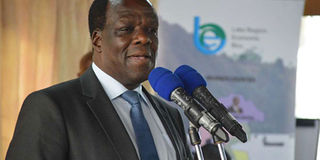Somebody tell governors that impunity not same as immunity

Kakamega Governor Wycliffe Oparanya speaks during the Lake Region Economic Bloc meeting in Kisumu on July 5, 2018. Mr Oparanya is viewed as a possible political asset by Jubilee Party in 2022. PHOTO | ONDARI OGEGA | NATION MEDIA GROUP
What you need to know:
- Advocating immunity in Kenya by State officials is a gross abuse of power. The same goes for anticipatory bail.
- The demand for immunity by a section of leaders is, therefore, troubling and should not be allowed to see the light of day.
As tongue twisters go, impunity and immunity are a hard nut to crack for anyone with warped ideas of leadership.
It is very easy to mistake impunity for immunity if you know which side of your bread is buttered.
For those still confused, impunity is not related to immunity in any shape, size or form.
I decided to help out those leaders who have expressed their wish to be granted immunity from prosecution while in office.
This is well and good but there are limits to how far immunity can go in offering protection.
Immunity is synonymous with the diplomatic immunity under the Geneva Convention on Diplomatic Relations (1961).
Briefly, this was to offer legal immunity that “ensures diplomats are given safe passage and are considered not susceptible to lawsuits or prosecution under the host country’s law”.
INDICTED
However, this is not a principle that is etched in stone.
If there are grave and serious crimes committed by diplomats, or it’s in the public’s interest, then the laws of the host country would kick in to prosecute the said diplomat(s) accordingly.
In recent years, there have been cases of diplomats indicted by the host countries of serious crimes such as masterminding illegal drug trafficking, rape, slavery and murder.
Those who believe immunity could be offered in domestic legal systems just because they occupy a ‘big’ office despite their level of criminality are gravely mistaken.
Lawyers worth their salt can, with a very fine toothcomb, scour law books and challenge immunity given to unscrupulous leaders.
INJUSTICE
Corruption has proven to be one such criminal act that ought not to be allowed to be swept under the carpet of a delusional sense of immunity.
Offering immunity to corrupt leaders is not just a sure way of contributing to social injustice; it also offers a two-tier legal system, where only a select few remain above the law by virtue of their ‘big (wo)man’ syndrome.
Advocating immunity in Kenya by State officials is a gross abuse of power. The same goes for anticipatory bail.
Why anyone would want to pre-empt the law if they are innocent is a mystery. They are, in fact, tacitly incriminating themselves. The guilty can only be afraid and our interest is piqued!
Continued abuse of the principle of immunity has not only been a Kenyan affair.
INTERNATIONAL LAW
Boris Becker, the former top world tennis player, pulled a first of strange diplomatic immunities known to man when he declared he had protection as a diplomat of Central African Republic.
This was with a view to frustrating a bankruptcy case against him in London.
I can’t speak for the world but I am still struggling to get my head around a German as a diplomat of the Francophone CAR. No racism intended.
Impunity has its genesis in international law.
The main purpose of international legal instruments in this area was to help countries that are beleaguered by disregard for the rule of law, human rights abuses and weak legal systems to seek justice for those who suffer at the hands of brutal regimes.
RETROGRESSION
We are not witnessing disregard for the rule of law in Kenya, like in the past decades, and that is commendable.
The demand for immunity by a section of leaders is, therefore, troubling and should not be allowed to see the light of day.
Kenya went through a politically challenging period to usher in a new era through the globally acclaimed 2010 Constitution in order to stamp out impunity and herald a model African democracy.
Bar a few hiccups here and there, so far so good. But if we are to even imagine offering any kind of immunity to those advocating it, we will be taking hundreds of strides back.
We will undo all the effort and hard work that was put in to create a transparent society that we had been yearning for.
CIVIC DUTY
Giving immunity to a select few will only open the floodgates for similar undeserved requests and it will become an open-ended affair of abuse of power.
Crucially, such a call for immunity will have the potential of undermining the work of the various State agencies working hard to eradicate corruption in the country.
The law ought to be elastic to meet social needs. However, if its scope is expanded, twisted and turned to satisfy selfish interests, then it has failed the country.
The regional — actually all — leaders need to periodically re-familiarise themselves with their civic duty, legal mandate and the scope of their work.
DISCONNECT
Most importantly, get to grips with the true essence of the rule of law.
Lastly, to try and come closer to those they purport to lead, so as to understand the consequences of their words and deeds.
For there seems to be a disconnect between them and the public.
For governors to even think of seeking immunity, they have drawn an iron curtain between themselves and the electorate and are undermining the rule of law.
Ms Guyo is a legal researcher in Kenya and the United Kingdom. [email protected].





